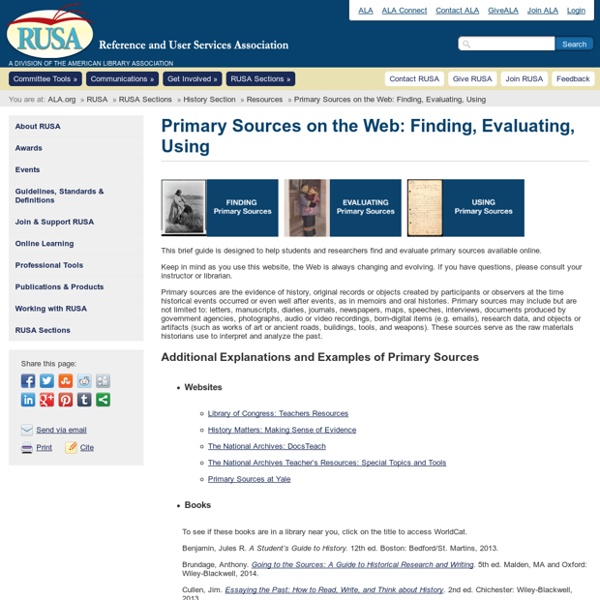Reference & User Services Association (RUSA)

History
General History Resources American Experience Access to PBS series about American history. American Historical Association As the professional organization for historians, the AHA advocates for the profession and provides information, awards and grants, and resources for educators. Archiving Early America This site provides historical documents from 18th century America. A Biography of America This site was designed to be a self-contained college-level history course. Center for History and New Media Links to general history resources as well as specific events. Discover History The National Park Service offers links to Features of People, Places & Stories and Features of Preservation, Guidance & Grants. History & Social Studies This site from the National Endowment for the Humanities provides lesson plans about American history. History Collection University of Pennsylvania Libraries' links to resources with text archives and image sites. National History Day Provides resources for educators. U.S.
Sanborn® Fire Insurance Maps
Sanborn® Fire Insurance Maps for Georgia Towns and Cities, 1884-1922 consists of 4,445 maps by the Sanborn Map Company depicting commercial, industrial, and residential areas for 133 municipalities. Originally designed for fire insurance assessment, the color-coded maps relate the location and use of buildings, as well as the materials employed in their construction. The maps indicate which city utilities--such as water and fire service--were available. Fire insurance maps document the changing face of towns and cities, providing highly detailed information for each neighborhood and block. The Library of Congress web site refers to them as "probably the single most important record of urban growth and development in the United States during the past one hundred years." The Sanborn Maps® database is a project of the Digital Library of Georgia as part of Georgia HomePLACE.
Library surveys
Library surveys are a useful way to align your library resources and services to meet teacher and student needs. Contents Purpose of your survey: what you want to find outDeciding on who to survey - and whyTips on how to create a good surveyCollection development surveysInformation literacy surveysLibrary use and environment surveysTeacher surveysSurvey methods Purpose of your survey: what you want to find out Have specific goals and purposes in mind before you create your survey. What data do you want to collect? For example, information on favourite genres and authors could be used to: Develop your collection (fiction, non-fiction, magazines, online resources)Engage reluctant readers by shoulder-tapping them with a selection of books they may enjoyInspire displays and shelving decisions Surveying students on their attitudes toward reading at the beginning and end of a year / unit can be a useful way to: Deciding on who to survey - and why What information do I want to collect? Teacher surveys
Internet History Sourcebooks Project
Internet History Sourcebooks Project Paul Halsall, Editor Last Modified: Nov 4 2011 | linked pages may have been updated more recently The Internet History Sourcebooks Project is a collection of public domain and copy-permitted historical texts presented cleanly (without advertising or excessive layout) for educational use. Update Information 2006: In 2006 the Internet History Sourcebooks Project is undergoing a major overhaul to remove bad links and add more documents. 1. 2. 3. Feedback and Help While I encourage notes, comments and feedback in general, I am unable to reply to all of them. For guidance on homework, research, how people lived/ate/dressed in the past, see the various Help! I am unable to help locate details about your family, or give translations of your name or nickname into Chinese (a very common request)! Finding Texts and Information on this Site Use the Search page to find texts or other items located at this web site. Statement on Copyright and Fair Use
What’s our future – school libraries and librarians
It disturbs me that we are not seriously thinking about the future of school libraries. This statement will receive incensed objections; teacher librarians are, after all, talking about changes in what we do and how we do it at conferences and in their own libraries. We talk about some of these changes in my own school library – delivering ebooks, providing transferable skills such as critical literacies to our students, delivering online resources. I don’t know about you but I can’t stop thinking about this topic. Just this morning I asked Jenny Luca on Twitter what she would be speaking about at the SLAQ2012 conference. Also this morning I found on Twitter (via Judy O’Connell) a link to this article from Northwest England: ‘Special report: The future of public libraries; what the senior managers think’. I’ve pulled out what I think is relevant to school libraries (open to discussion about these) - What are the core services of libraries now and in ten year’s time? Like this:
Related:
Related:



